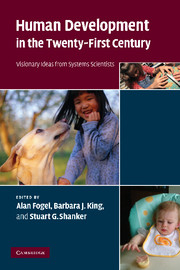Book contents
- Frontmatter
- Contents
- List of contributors
- Introduction: Why a dynamic systems approach to fostering human development?
- Part I Dynamic relationships between genetics and environments
- Part II The dynamic system of the child in the family
- Part III The dynamic system of the child in social and physical environment
- 10 The tempest: anthropology and human development
- 11 An anthropology of human development: what difference does it make?
- 12 The social child
- 13 Learning about human development from a study of educational failure
- 14 Dynamic views of education
- 15 Embodied communication in non-human animals
- 16 Children in the living world: why animals matter for children's development
- Part IV Dynamic systems approaches to mental health
- Part V Conclusions and outlook
- Index
11 - An anthropology of human development: what difference does it make?
Published online by Cambridge University Press: 22 September 2009
- Frontmatter
- Contents
- List of contributors
- Introduction: Why a dynamic systems approach to fostering human development?
- Part I Dynamic relationships between genetics and environments
- Part II The dynamic system of the child in the family
- Part III The dynamic system of the child in social and physical environment
- 10 The tempest: anthropology and human development
- 11 An anthropology of human development: what difference does it make?
- 12 The social child
- 13 Learning about human development from a study of educational failure
- 14 Dynamic views of education
- 15 Embodied communication in non-human animals
- 16 Children in the living world: why animals matter for children's development
- Part IV Dynamic systems approaches to mental health
- Part V Conclusions and outlook
- Index
Summary
As the reincarnation of a specific ancestor, a Beng baby of the Côte d'Ivoire is enticed into staying alive by virtue of the mother's care in looking after it and especially in keeping it clean and fed and beautified with bracelets and skin paint; by these means the infant is persuaded to detach itself from the invisible ancestral realm and recognize its kinship with the living. Infants are understood to desire to return to the ancestral realm, so it is not until a child is walking and speaking that it is known to be surely desirous of remaining with the living – a desire that is only fully accomplished when, at the age of six or seven, the child is able to understand and express in speech its knowledge of the difference between dreaming and waking or of death. This brief and unexamined example suggests the possibility that people's ideas of themselves, of kinship, of bodily substance, of what a child is and can be, may be manifold and varied. As indeed they are. Thus a child of the Amazonian Araweté is solely the product of its father's semen for which the mother is the receptacle, but children of the same mother assert their closeness to one another as successive occupants of the same place.
- Type
- Chapter
- Information
- Human Development in the Twenty-First CenturyVisionary Ideas from Systems Scientists, pp. 104 - 111Publisher: Cambridge University PressPrint publication year: 2007
- 1
- Cited by



